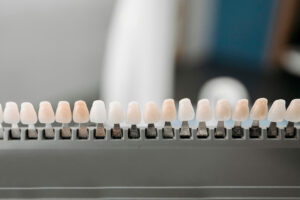Have you ever taken a sip of ice-cold water, only to immediately get a sharp, unexpected jolt of pain in your teeth? You’re not alone. Tooth sensitivity affects millions, turning simple pleasures like enjoying a hot cup of coffee or indulging in a sweet treat into a painful ordeal. This common dental issue can significantly impact your quality of life, making it crucial to understand its causes and how to manage it effectively.
For those in search of a beautiful and functional smile, especially individuals aged 40 to 70 who are considering significant dental transformations, understanding tooth sensitivity is essential.
Navigating the world of dental care can be overwhelming, but knowing the root causes of tooth sensitivity—from enamel erosion to gum recession—empowers you to take control. In this blog post, we will delve into the common triggers of tooth sensitivity, practical ways to alleviate discomfort, and preventive measures to maintain a pain-free smile. We aim to provide you with actionable insights and expert advice that align with your dental needs and aspirations. Let’s embark on this journey to a more comfortable and confident smile.
Common Causes of Tooth Sensitivity
Experiencing a sharp pain when consuming hot or cold foods can be an indication of tooth sensitivity. This discomfort often occurs due to exposed dentin, the layer beneath your enamel, which becomes vulnerable when enamel erodes or gums recede. Understanding the common causes of tooth sensitivity can help you take proactive steps to manage and prevent it.
Several factors contribute to tooth sensitivity, affecting individuals differently. While some causes are related to lifestyle choices, others may be linked to dental conditions or procedures. Let’s explore these causes in detail.
Enamel Erosion
Enamel, the hard outer layer of your teeth, serves as a protective barrier. However, it can erode over time due to various reasons, leading to tooth sensitivity. Consuming acidic foods and beverages, such as citrus fruits, soda, and wine, can gradually wear down enamel. Additionally, aggressive brushing with a hard-bristled toothbrush can contribute to enamel loss.
To minimize enamel erosion, consider using a soft-bristled toothbrush and fluoride toothpaste. Limiting the intake of acidic foods and drinks can also help preserve your enamel.
Gum Recession
Gum recession occurs when the gum tissue pulls back, exposing the roots of the teeth. This condition can be caused by periodontal disease, aggressive brushing, or even genetic factors. When the roots are exposed, they become sensitive to temperature changes and certain foods.
Maintaining proper oral hygiene and visiting your dentist regularly can help prevent gum recession. If you notice signs of gum recession, such as increased sensitivity or visible roots, consult your dentist for appropriate treatment options.
Teeth Grinding and Clenching
Grinding or clenching your teeth, also known as bruxism, can wear down enamel and expose the dentin. This habit often occurs unconsciously during sleep or stressful situations. Over time, it can lead to significant enamel loss and increased tooth sensitivity.
Using a mouthguard at night can protect your teeth from the effects of grinding. Additionally, stress management techniques and lifestyle changes may help reduce the occurrence of bruxism.
Understanding these common causes of tooth sensitivity empowers you to take preventive measures. By addressing these factors, you can reduce discomfort and maintain a healthy, pain-free smile.
Effective Remedies for Tooth Sensitivity
Experiencing tooth sensitivity can be a frustrating ordeal, but the good news is that there are several effective remedies to alleviate this discomfort. By incorporating these strategies into your daily routine, you can enjoy your favorite foods and drinks without the sharp, unexpected pain that often accompanies sensitive teeth.
According to the Mayo Clinic, using a soft-bristled toothbrush and avoiding acidic foods are simple yet effective steps to manage sensitivity. Additionally, there are numerous products and treatments available that can provide relief and protect your teeth from further damage.
Desensitizing Toothpaste
One of the most accessible remedies for tooth sensitivity is desensitizing toothpaste. These specially formulated toothpastes contain compounds that help block pain signals from reaching the nerves in your teeth. Regular use can lead to a significant reduction in sensitivity over time.
- Choose a toothpaste with potassium nitrate or strontium chloride, which are known for their desensitizing properties.
- Apply a small amount directly to sensitive areas before bedtime for added relief.
Fluoride Treatments
Fluoride is a mineral that strengthens tooth enamel and reduces sensitivity. Dentists often recommend fluoride treatments for individuals experiencing tooth sensitivity.
- Professional fluoride treatments are available at your dentist’s office and can provide immediate relief.
- For ongoing protection, consider using a fluoride mouthwash or gel at home.
Dental Bonding and Sealants
For more severe cases of sensitivity, dental bonding or sealants might be necessary. These treatments involve applying a protective layer over exposed tooth roots, reducing sensitivity and preventing further damage.
- Dental bonding is a quick procedure that can be completed in a single visit to your dentist.
- Sealants offer long-lasting protection and are particularly effective for individuals with gum recession.
By incorporating these remedies, you can effectively manage your tooth sensitivity and improve your overall dental health. For more personalized advice and treatment options, consider consulting with a dental professional. If you’re exploring comprehensive dental solutions, Aleriom offers expert services to help you achieve a pain-free, beautiful smile. Visit our website to learn more about our offerings.
Preventive Measures to Avoid Tooth Sensitivity
Maintaining a pain-free smile involves more than just addressing existing tooth sensitivity; it’s about taking proactive steps to prevent it. By incorporating specific habits into your daily routine, you can significantly reduce the risk of sensitivity and enjoy your favorite foods and drinks without discomfort.
Preventing tooth sensitivity starts with understanding the factors that contribute to it. From choosing the right toothbrush to making dietary adjustments, these preventive measures can help you maintain optimal dental health and avoid the discomfort associated with sensitive teeth.
Practice Good Oral Hygiene
One of the most effective ways to prevent tooth sensitivity is to maintain excellent oral hygiene. Regular brushing and flossing remove plaque and bacteria that can lead to gum recession and enamel erosion. Use a soft-bristled toothbrush to avoid damaging your gums and enamel.
Incorporate fluoride toothpaste into your routine to strengthen your enamel. According to the American Dental Association, fluoride helps to remineralize enamel, making it more resistant to acid attacks from plaque bacteria and sugars in the mouth.
Choose the Right Dental Products
Using the correct dental products can make a significant difference in preventing sensitivity. Opt for a desensitizing toothpaste if you notice early signs of sensitivity. These toothpastes contain compounds that help block the transmission of pain signals from the tooth surface to the nerve.
Additionally, consider using a fluoride mouthwash to provide an extra layer of protection for your teeth. This can be especially beneficial if you consume acidic foods or beverages regularly.
Regular Dental Check-ups
Regular visits to your dentist are crucial for preventing tooth sensitivity. During these check-ups, your dentist can identify early signs of enamel erosion or gum recession and provide appropriate treatments to prevent further damage.
Professional cleanings and fluoride treatments can also help maintain your dental health, ensuring your teeth remain strong and less susceptible to sensitivity. If you’re interested in exploring comprehensive dental solutions, consider visiting Aleriom’s website to learn more about our services.
Preparing for your next Dental Procedure? Check out our blog Essential Questions to Ask Your Dentist Before a Dental Procedure
Checklist for Preventive Measures
- Brush twice daily with a soft-bristled toothbrush.
- Use fluoride toothpaste and mouthwash.
- Floss daily to remove plaque between teeth.
- Limit intake of acidic foods and drinks.
- Visit your dentist regularly for check-ups and cleanings.
- Consider desensitizing toothpaste if sensitivity begins.
- Use a mouthguard if you grind your teeth at night.
Implementing these preventive measures can help you maintain a healthy, comfortable smile. By taking these steps, you not only protect your teeth from sensitivity but also enhance your overall oral health. For more personalized advice and to explore dental solutions tailored to your needs, visit Aleriom’s website.
Embrace Comfort with Proactive Dental Care
Managing tooth sensitivity effectively begins with understanding its root causes and embracing preventive strategies. By identifying triggers such as enamel erosion, gum recession, and teeth grinding, you can take proactive steps to protect your teeth and maintain a pain-free smile. Simple lifestyle changes, like using a soft-bristled toothbrush and avoiding acidic foods, can make a significant difference in reducing discomfort.
Implementing remedies such as desensitizing toothpaste and fluoride treatments can provide immediate relief and long-term protection. These solutions, combined with regular dental check-ups, ensure that your teeth remain strong and less susceptible to sensitivity. At Aleriom, we prioritize your dental health by connecting you with top dentists and offering comprehensive solutions tailored to your needs.
Key Takeaways for Managing Tooth Sensitivity
- Identify and address common causes like enamel erosion and gum recession.
- Use desensitizing toothpaste and fluoride treatments for relief.
- Incorporate preventive measures such as good oral hygiene and dietary adjustments.
- Consult with a dental professional for personalized advice and treatments.
Don’t let tooth sensitivity interfere with your quality of life. By taking these steps, you can enjoy your favorite foods and drinks without the worry of pain. If you’re considering a dental transformation or need expert advice, explore Aleriom’s offerings to achieve a comfortable and confident smile. Visit our website to learn more about our services and how we can help you reclaim your dental health.








